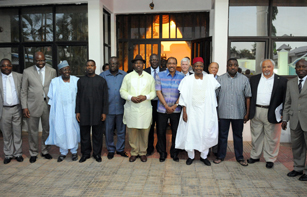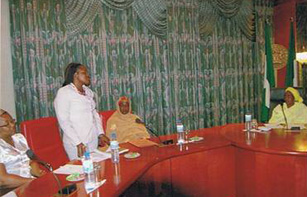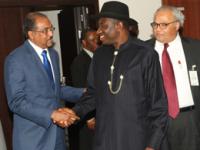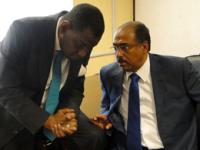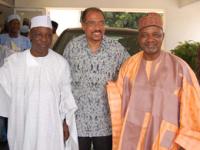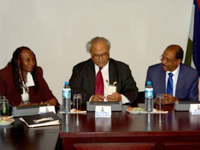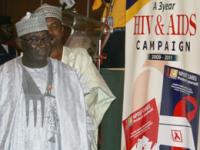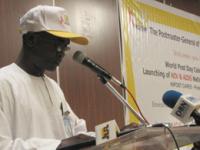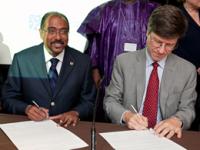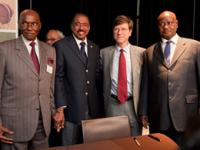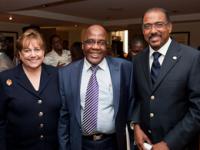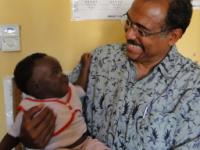
UNAIDS Executive Director Michel Sidibé meets Agnes, 21 February 2010.
Credit: UNAIDS
Agnes, barely six months old, was comfortable going into the lap of complete strangers, smiling and clutching fingers that were extended towards her. She has been making regular visits to the clinic with her mother Sarah and father Yusuf Samalia. These have been made possible by the Millennium Village Project that is providing comprehensive health, education and poverty alleviation programmes in the Pampaida village located in the Kaduna state of Nigeria. Of the 20,000 people who live in the area around 44% are in the reproductive age groups.
Five years ago, few pregnant women would go to a health centre to get an antenatal check up. Most would never return after their first visit. It was common that women gave birth at home, often attended by untrained help and no recourse to healthcare in case of an emergency.
Yusuf and Sarah have shown courage by taking the HIV test and to ensure that they give their child a full chance to be born without HIV. We can and must eliminate mother to child transmission by 2015.
Michel Sidibé, UNAIDS Executive Director
Sarah however belongs to a new generation that has seen her village transform as she became an adult. The village health worker motivated her and other women to come to the local health clinic for routine check ups. Here trained doctors and nurses provide quality health care. The results can be felt by the community. Between 2007 and 2009 there were about 240 institutional deliveries, a three fold increase in women who have benefited from maternal child health services that have come nearer to home. There were only four deaths due to pregnancy related complications, a sharp drop from times before the project began.
At one of her antenatal check ups, Sarah was diagnosed as living with HIV. She was offered treatment and counselling on how to prevent her child from getting infected. She coaxed her husband to take the HIV test at the clinic. He too was found to have HIV.
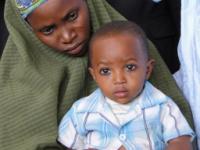
Mother and child attend the health clinic in Pampaida village, 21 February 2010.
Credit: UNAIDS
Yusuf has a second wife. “I am now romancing her to come and take the test,” he said. His eyes are hopeful that she may not have been infected.
Dr Ojo Euitayo and his team sent Sarah to the referral hospital some 30 kilometres away from her village, a burden they feel is too much¬—physically as well as financially for the people of the village. But the parents were determined to ensure that their baby was not born with HIV. “We have to stop all new infections. It is our moral duty.” Yusuf told the visiting UNAIDS Executive Director and Deputy Governor of the Kaduna State.
“Yusuf and Sarah have shown courage by taking the HIV test and to ensure that they give their child a full chance to be born without HIV,” said Michel Sidibé, UNAIDS Executive Director. “We can and must eliminate mother to child transmission by 2015.”
Agnes was born at the referral hospital in Kaduna and upon birth was administered antiretroviral prophylaxis. Her mother chose to breast feed her. “We counsel all mothers about infant feeding options, including substitution feeding. However most people cannot afford it,” says Dr Ojo. “Once the mother makes the decision, we take all efforts to support her.”
The millennium project in Pampaida in many ways demonstrates how the world can look like if we achieve the millennium development goals.
Janthomas Hiemstra, Deputy Country Director of Programmes for UNDP
The clinic serves as a good model for basic health care. They take the help of village health worker like Ibrahim who can treat malaria and diahorrea and help in referring patients with TB to the clinic. The village health workers are now professionals in their own right, even though they make have just barely passed school. With an intensive training they have been able to take on many tasks and freeing up the nurses and doctors to focus on major needs. The village clinic is now also experimenting with mobile phones, seeking advice from professionals as well as in monitoring the health progress of their village.
In a nearby youth centre, a different kind of transformation is taking place. Vuhu Lawal is learning how to use a computer and the internet along with his friend. Their equally young and energetic trainer Yusuf Ibrahim is proud to show off his centre. In between classes on how to use a word processor, he often talks to the young people about HIV and other issues. More children and young people are in school today, especially girls. The fields around the school and clinic have been tilled, thanks to loans as well as training available to the famers. Access to a thriving market has helped cut off the middle man, bringing more money into the household. Today, most people are living above the poverty line earning more than US$ 1 per day. All this has been possible with small but effective investment of US $110 per person.
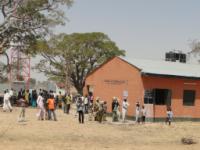
The local resource centre in Pampaida village, 21 February 2010.
Credit: UNAIDS
“The millennium project in Pampaida in many ways demonstrates how the world can look like if we achieve the millennium development goals,” said Janthomas Hiemstra, the Deputy Country Director of Programmes for UNDP which implements the project. The growing success of the programme has attracted other development investments in the area. The state government of Kaduna has built a road into the village and mobile telephony providers have installed a distribution tower.
The Deputy Governor of the Kaduna state Patrick Ibrahim Yakowa is happy with the success of the village and the national and international attention it is getting. “We must take the lessons learnt from Pampaida and apply it across Kaduna. We will work towards elimination of mother to child transmission and strive for zero new infections in Kaduna,” he promised.
Yusuf and Sarah are in many ways privileged to live in a millennium village. Elsewhere their fellow citizens have not been so lucky. Only 11% of HIV-positive pregnant women have access to mother to child transmission prevention services. Agnes has been given a chance to be born without HIV, but her parents and health care workers are waiting to find out about Agnes’s HIV status. The health centre currently does not have access to rapid infant diagnostic kits. Director General of National Agency for the Control of AIDS, Dr Joseph Idoko promises to make them available immediately. Till then Yusuf and Sarah will have to wait and hope for the best.






